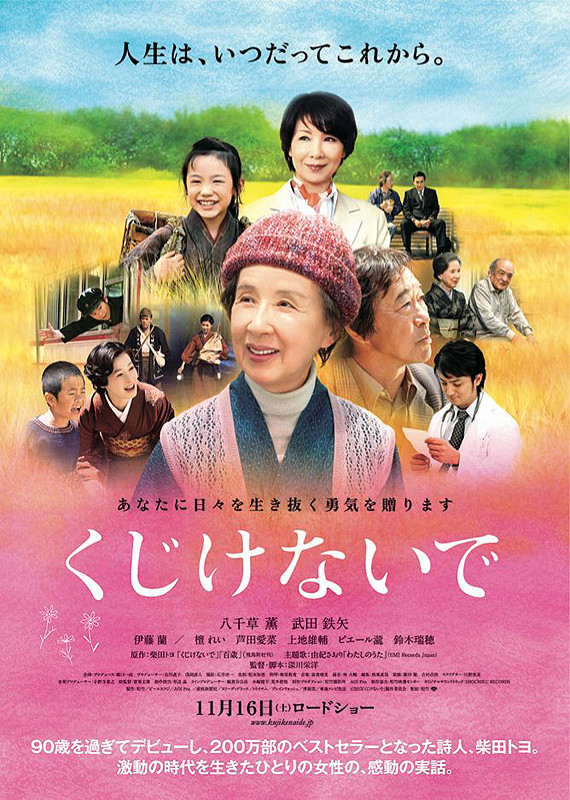The 17th Japanese Film Festival makes its final stop in Melbourne. Eden Law (Fukushima JET 2010-2011, JETAA NSW member) reviews some of the selection available.

So what have you done with your life lately?
Proving its never too late to start anything, at the age of 98, Toyo Shibata sold over 1.5 million copies of her poetry collection in Japan, later achieving international fame in Asia and Europe. Shown at Australia’s national 17th Japanese Film Festival a mere week after its release in Japan, “Don’t Lose Heart”, is the film inspired by Toyo’s life and her poetry. Its international premier in Sydney was also accompanied by both the visiting director Yoshihiro Fukagawa, and the main star who plays Toyo, Kaoru Yachigusa, a legendary name in Japanese cinema.
Up until the time Toyo received recognition of her work, she lived a typical, seemingly unremarkable life as a elderly member of Japan’s rapidly aging population: a widow who lives alone, with one surviving son, Kenichi (Tetsuya Takeda) , an unreliable, chronic gambler who is terminally unemployed and financially supported by his exasperated but ultimately loving wife, Shizuko (Ran Ito). Worried about the mental state of his mother, and feeling guilty about what a big loser he is, Kenichi writes poetry with her as away of spending more time together, which eventually brought out her literary talents.
Films which contain roles for older actors are rare, and as Yachigusa said during the Q&A after the movie’s screening in Sydney, good roles are even rarer still. Yachigusa has the challenge of developing Toyo as being more than just another grannie. At first Toyo seems pitiful – she is beset by the usual ills that advanced age brings, finding it difficult to move around pain-free without a walking stick. She seems a little bland, quiet and unremarkable. However when she begins to write, the film shifts into exploring the source of her inspiration, in flashbacks that regress further and further into time. “Don’t Lose Heart” is certainly aptly named, as Toyo, in her quiet way, reaches out to counsel those around her with the benefit of her experience. By the end, Toyo is revealed to be anything but ordinary. Being alive is a pretty difficult gig for anyone, and Toyo proves she’s just as tough a chick as any fictional superhero, and more inspiring than any easily digestible soundbite artificially manufactured by cynical corporations to move units.
Yachigusa is just extraordinary in her performance. Her Toyo is dignified and gentle, but with a hint of impish mischief that shows a quick and intelligent mind is alive and well – quite similar to Yachigusa herself in the interview. She gives Toyo vulnerability and frailty, but is able to convey the fighter and survivor beneath the exterior, and the resulting sense of compassion and understanding of human nature gained from having being through it all herself. Takeda plays Kenichi as a petulant short-tempered man-child, a bit over the top maybe (you have to wonder what the real Kenichi thought of his on-screen portrayal) but possessing of the same compassionate basic nature of his mother. And as Kenichi’s wife, Ito is also superb, displaying the patience of a saint in staying with him all through the years.
Be warned: this film moved Sydney audience to tears, rather loudly too, perhaps because Toyo seemed like the kind of grandmother everyone wishes they have (unfortunately Japan’s national grandmother passed away earlier this year at the age of 101). Fukagawa said that her poetry gained prominence because of their simplicity and lack of pretension and their inherent optimism and positivity, qualities that he tries to convey in his film. He can be rather sentimental at times, imparting an almost saintly, Buddha-like glow on Toyo by the end of the film, but there is a lot of respect for the source material in this film, and it shows, resulting in a tender, tribute to not just Toyo’s writings, but to the human condition itself.
Don’t Lose Heart (Kujikenaide) by Yoshihiro Fukagawa, released November 16 2013 in Japan. Starring Kaoru Yachigusa, Tetsuya Takeda, Ran Ito, Mizuho Suzuki and Yusuke Kamiji.


Comments are closed.